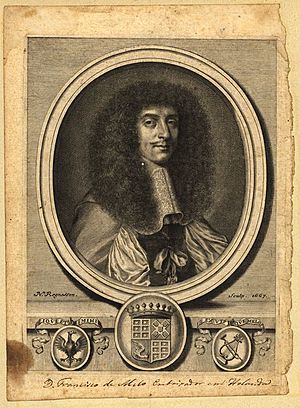Francisco Manuel de Mello facts for kids
Quick facts for kids
Francisco Manuel de Mello
|
|
|---|---|
 |
|
| Born | 23 November 1608 |
| Died | August 24, 1666 (aged 57) Lisbon
|
| Occupation | Writer, soldier |
Francisco Manuel de Mello (born November 23, 1608 – died August 24, 1666) was a famous Portuguese writer and soldier. He lived during a time when Portugal was going through many changes. He is known for his writings, which include history, poetry, and letters.
Contents
Early Life and Education
Francisco Manuel de Mello was born in Lisbon, Portugal. His family was connected to the royal House of Braganza. From a young age, he showed great talent. He studied at the Jesuit College of St. Antão.
People say he wrote a long poem at age fourteen. This poem celebrated the recovery of Bahia from the Dutch. At seventeen, he wrote a scientific book called Concordancias mathematicas. This shows he was very smart and interested in many subjects.
Military Adventures
Francisco's father, Dom Luiz de Mello, passed away early. This led Francisco to join the army. In 1627, he was part of a fleet going to the war in Flanders. His ship was caught in a big storm in the Bay of Biscay. Many Portuguese ships were lost.
For the next ten years, he served as a soldier in Spain and Portugal. He also visited the court in Madrid. There, he became friends with the Spanish poet Francisco de Quevedo. He also gained the support of a powerful minister, Olivares.
In 1637, Olivares sent him on a mission. He went with the Conde de Linhares to calm down the city of Évora. This city was in revolt. At the same time, the Duke of Braganza asked him for help. The Duke later became King John IV. Francisco helped him show loyalty to the king of Spain.
Battles and Campaigns
In 1639, Francisco became a colonel. He led a regiment for service in Flanders. In June of that year, he helped defend A Coruña from a French fleet. The next month, he helped 10,000 soldiers get ready for a sea battle. This was when Admiral Oquendo sailed to fight the French and Dutch.
He survived a big naval defeat. This was the Battle of the Downs, where the Spanish lost to the Dutch. When the Catalan revolt started, he became a chief officer. He was chosen to write about the campaign. His book, Historia de la guerra de Cataluña, became a classic in Spanish.
Return to Portugal
In 1640, Portugal got its own ruling family back. This was called the Restoration War. Francisco was put in prison by Olivares. When he was released, he quickly joined King John IV.
He traveled to England and spent time with King Charles I. Then he went to Holland. There, he helped the Portuguese ambassador get a fleet ready. This fleet was to help Portugal. Francisco himself brought the fleet safely to Lisbon in October 1641.
For the next three years, he had important military jobs. He also used his writing skills to defend the new king's right to the throne.
False Accusation and Exile
On November 19, 1644, Francisco was arrested. He was falsely accused of a serious crime. He spent about nine years in prison. Even though he was innocent, his enemies influenced the court. He was removed from his position in the Order of Christ. He was also sentenced to live in Africa and pay a large fine. The king did not help him.
Later, his sentence was changed. He was sent to the colony of Brazil instead. This might have been because powerful friends, like the queen of France, helped him.
Writing in Prison and Exile
During his long time in prison, he finished and published his history of the Catalan Revolt. He also wrote a book of Spanish poems and some religious books. In Portuguese, he wrote a book of simple wisdom called Carta de Guia de Casados. He also wrote a letter to the king defending himself. This letter is considered a very powerful piece of writing.
He sailed to Brazil on April 17, 1655. He lived in Bahia, where he continued to write. He wrote parts of his famous work, Apologos dialogaes, there.
Literary Achievements
Francisco returned to Portugal in 1659. From then until 1663, he was often in Lisbon. He was a member of the famous Academia dos Generosos. He was chosen as its president five times.
In 1663, he traveled to Parma and Rome. He went through England and France. King Afonso VI asked him to talk with the Church leaders. He was to discuss bishops for Portugal and suitable marriages for the king. While in Rome, he published his Obras morales. He also published his Cartas familiares, which are letters to his family and friends.
On his way back to Portugal, he printed his Obras Métricas in Lyon in May 1665. He passed away in Lisbon the next year.
His Writing Style
Francisco Manuel de Mello's early Spanish poems were influenced by Gongora. His Portuguese poems and letters on moral topics are known for their strength and honesty. He worked hard to create his own unique style. Because of his talent and knowledge of traditional poetry, he became Portugal's most important writer of the 17th century.
Like Luís de Camões, his time in prison and exile helped him become a great writer. His letters are written in a friendly, conversational way. They are full of clever ideas and good examples. His book Hospital des lettras is a brilliant piece of writing about literature. His play, Auto do Fidalgo Aprendiz, is a funny comedy. It is similar to Molière's Le Bourgeois gentilhomme.
See also
 In Spanish: Francisco Manuel de Melo para niños
In Spanish: Francisco Manuel de Melo para niños
 | Kyle Baker |
 | Joseph Yoakum |
 | Laura Wheeler Waring |
 | Henry Ossawa Tanner |

